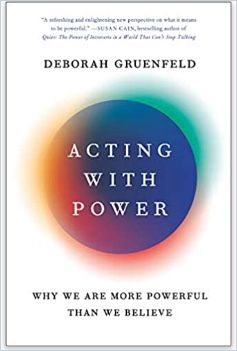Stanford School of Business professor Deborah Gruenfeld offers a primer in recognizing and utilizing various forms of power.

Wield Power Well
Stanford School of Business professor Deborah Gruenfeld regards power as a role you play, not an innate quality. She encourages readers to regard power in a more constructive and expansive way and provides guidance about using power appropriately and countering its abuse.
Professor Gruenfeld is co-director of the Executive Program in Women Leadership at Stanford and a board member of Stanford’s Center for the Advancement of Women’s Leadership. Power is her beat. She makes an impassioned case for reimagining powerful leadership as applied beneficence – acting effectively for the greater good.
Circumstances, Roles and Relationships
In Gruenfeld’s definition, power is the ability to exert social control over others. Power centers on relationships and context, not individual traits. Power depends on the social contract, and power differentials among people affect their work, their home, and their social and political life.
Power is not a personal attribute or possession. Power is a part you play in someone else’s story.Deborah Gruenfeld
Power resides in the ability to draw people together to accomplish shared goals. How and why you wield your power matters far more than how much you have.
Knowing How and When
Calling attention to your power should be a deliberate choice, made with specific objectives and a clear understanding of the likely impact. Deploy power wisely and in service to your team.
Power has two faces, no matter who you are. You can play it up, show it off and remind others who has the upper hand. And you can play it down, minimize it and remind others how important they are.Deborah Gruenfeld
Body language plays up power through people’s biological legacy as social animals. To use your physical presence to assert power without words, Gruenfeld says with great specificity, take up space, hold your head high, make yourself comfortable and move with confidence. Use language to remind people of your relative authority.
Power commands attention. Define your relative power by making sure others pay attention to you and by bestowing your attention selectively. Interrupting others with impunity signals power – or rudeness. As with all her counsel, Gruenfeld advocates making thoughtful, deliberate choices.
This segment – and others – exemplifies her fascinating shifting back and forth between hard-nosed realpolitik and a generalized, almost New Age benevolence. Thus, she shows – without wasting words stating it explicitly – that effectively wielding power can and must include both approaches. Gruenfeld’s knowing embrace of both methods proves quite charming and credible.
De-emphasizing Power
Play down your power to establish trust, demonstrate respect and invite others into a relationship. Temporarily sacrifice overt markers of your power to gain status by building rapport and reciprocity.
Showing respect demonstrates that you value respect. Sharing your expertise and wisdom increases your prestige and influence. Participatory leadership will eventually result in gaining greater creativity, productivity and buy-in.
Play Your Role
Show yourself in the best possible light. Evaluate each situation, and showcase the aspects of yourself best suited to the circumstances.
Roles exist to advance collective causes…A willingness to take personal risk for the good of the group is the most reliable source of status.Deborah Gruenfeld
Relying on what feels comfortable or familiar may impede your opportunities to wield power effectively. Fulfill your role with integrity, in alignment with your values and in service to your mission. Don’t worry about being yourself.
Second-In-Command
Power resides in supporting roles, if you don’t overplay your hand. To show yourself as trustworthy, identify your rank in the social hierarchy, read the room and act accordingly. Contributing to the success of your leader and your firm will bring you knowledge, skill and, possibly, recognition. When your colleagues see that you’re willing to sacrifice for their success, you gain stature and loyalty as you prepare for your next, greater role.
Master Fear
Responsibility can terrify you. If you feel performance anxiety about the risk of public failure, it may manifest as impostor syndrome, feelings of unpreparedness, untested competence and unmerited authority.
The moment we step into a powerful position is the moment we realize how little control we actually have.Deborah Gruenfeld
But you can overcome performance anxiety. First, adopt movement and breathing techniques to alleviate physical reactions. Rehearse your performance of power – not only your words, but how you’ll handle props and materials, and how you’ll sit, stand and move.
Accept that fear comes with power, and let it motivate you to do your best.
Entitlement
Power brings a sense of feeling entitled to obedience, better perks and freedom from consequences. Individuals with power in one sphere may expect the same benefits elsewhere.
Whether and how power corrupts depends on what goals are most pressing when the opportunity to use power presents itself.Deborah Gruenfeld
Those who abuse their power can be bullies, megalomaniacs or sexual predators. Bullies need to have control, but they never exert it in their victims’ best interest. Megalomaniacs feed their weak self-worth by seizing status, acclaim and power. Sexual predators – almost exclusively men – use power to obtain gratification.
Become an “Upstander”
To face a bully – a person abusing power – empower and protect yourself. Remember: A bully’s behavior is never your fault. When a bully tries to push past your boundaries, stay calm and refuse to engage. Bullies expect and need deference, so a bully who ends up facing calm resistance may crumble.
No one has the right to control you – we choose to give others that right, and we can choose to take it away…Your story belongs to you. Deborah Gruenfeld
Become an upstander when you witness abuse. That is, stand up to abuse. People often fail to – or fear to – intervene because they don’t feel they have standing or permission. Empower yourself to ally with victims of abuse, and urge people of influence to join you. Having two or more people express concern and dissent makes a much more powerful statement than one.
Beneficence
Maturity, sharing credit and developing a track record of beneficence mark effective leadership, and pertain to neither gender nor exclusion.
Good leaders combine aspiration with a need for genuine achievement. Look for those who see power as a responsibility and seek successful outcomes for their group. Choose leaders for their warmth, reliability and willingness to engage and take personal risks.
Tough and Kind
Though she writes of the need for warmth, Deborah Gruenfeld’s tone remains stern and teaching. Brené Brown, she ain’t. Gruenfeld regards power and power differentials as constant facts of life you must deal with tactically; this frees her from any sentimentality and any refutation of power as somehow immoral. Get and keep all you can, seems to be her mantra, provided you use power wisely and for the benefit of others. Obviously, no author can easily maintain such a contradictory stance. Gruenfeld wisely anoints the tougher perspective as the most effective.
Other works on power include The 47 Laws of Power by Robert Greene; Power and Women by Mary Beard; and Inferior by Angela Saini.




